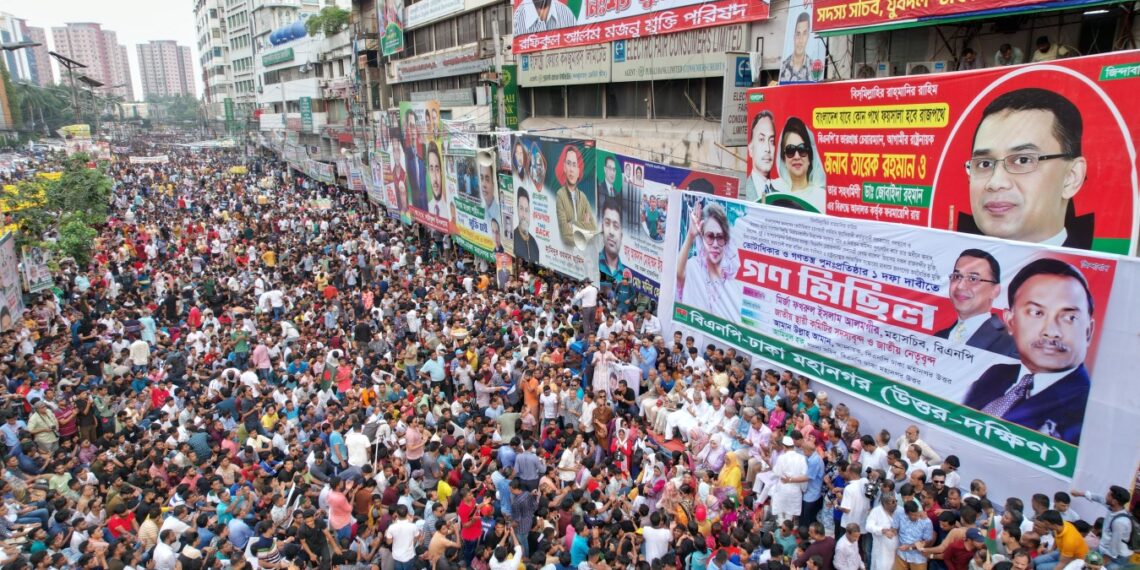On October 9, a delegation of leaders of the Bangladesh Nationalist Party (BNP), which has shown no inclination so far to take part in the forthcoming elections to parliament, met a team of representatives from two American think tanks to deliver a clear message: the party was not prepared to contest the elections under the Sheikh Hasina regime and that they would only relent if the electoral exercise was held under a caretaker or interim government.
The BNP team also included a lawyer who carried with him a great deal of information on innumerable cases of human rights abuses committed by party cadres and supporters across most districts of Bangladesh’s. It has now emerged that the BNP team did not have any minority community leader on it even though the party has time and again cried hoarse on the atrocities that have routinely been committed against the country’s Hindus under the ruling Awami League.
On the other hand, the same day – October 9 – an Awami Leaue delegation that met the six-member team of Americans, drawn from the International Republican Institute (IRI) and the National Democratic Institute (NDI), had at least a lone Hindu leader, Biplab Barua, who is the party office secretary.
While media reports and anecdotal evidence indicate that attacks on Hindus and their places of worship have always been higher whenever the Awami League has been in power, the BNP has sought to be defensive on this very delicate subject. By the way, the shrinking minorities officially constitute only about 8 percent of Bangladesh’s total population of about 170 million.
The rest of the Awami League team comprised party general secretary Obaidul Quader, international affairs secretary Dr Shammi Ahmed, presidium member Muhammad Faruk Khan, information and research secretary Dr Salim Mahmud and executive committee member Professor Mohammad Ali Arafat.
The BNP was represented by its general secretary Mirza Fakhrul Islam Alamgir, party standing committee members Abdul Moyeen Khan and Nazrul Islam Khan, Amir Khusru Mahmud Chowdhury, Mohammad Islamail Zabiullah, organising secretary Shama Obaed and human rights affairs secretary Asaduzzaman Asad.
Although the BNP has at least well-known Hindu leaders, including Gayashwar Roy and Nitai Roy Chowdhury, besides the party’s own Hindu-Buddhist-Christian Welfare Front secretary Bijan Kanti Das, a former bureaucrat, none of the three found a place on the BNP delegation that met the US think tank representatives that have been in Dhaka since October 8 to assess whether the elections can be held under the prevailing political, social and economic circumstances in the country.
“We indeed have cut a sorry figure. We will do so next time,” admitted a BNP leader when reminded that the party did not include a single Hindu representative on its team.
Clearly, the Awami League, which has traditionally garnered a bulk of the Hindu votes in successive elections, has scored brownie points over the BNP. There is no doubt that the anti-incumbency factor may hit the Awami League which has been accused by all and sundry in Bangladesh of committing egregious acts of human rights abuses, maladministration, including police brutalities and high-handedness, and turning a blind eye to corruption and financial misappropriation and embezzlement.
More recently, there were a series of attacks against Hindus and their places of worship in different districts. Earlier this month, Munshiganj corporation mayor Haji Mohammad Faisal Biplab, an Awami Leaguer, hurled filthy abuses and communal slurs on sitting MP Mrinal Kanti Das. Biplab called Das a ‘malayun’, which is considered a communal slur by all secular political leaders, including those from the Awami League and the BNP. Das, an Awami League central committee member and a close colleague of Sheikh Hasina, took the attack on his chin though he admitted that “certain elements within the party, especially Faisal ‘Biplab’, have mounted communal attacks against me in the past”.
It has been three weeks since Biplab communally targeted Das, but the Awami League is yet to take any disciplinary action against the former, indicating party’s casual and cavalier attitude even while it claims to uphold the long-established principles of secularism, democracy, socialism and nationalism. Both Awami League and BNP leaders privately admit to the “quotidian communalism” across Bangladesh and especially in pockets where Hindus live.
Over time, Hindu anger and grievances have built up to force them to leave their homes for safer havens in India’s West Bengal and elsewhere. Hindus complain of unmet group aspirations. As for the BNP, it will have to try really hard and mend its ways should it even aspire to get even a miniscule part of the minority vote. Saying sorry for slip-ups or promising to have a Hindu leader “next time” won’t work.















